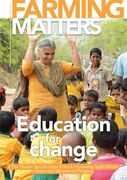Efforts to improve educational content and access in rural areas vary widely. Here we show just a few initiatives to develop a broader and more inclusive approach, focusing on the curricula, on the tools used or the target groups.
Peru: Young entrepreneurs
In Satipo, a town in eastern Peru, a group of young students gets together at school. But this is not a typical algebra, chemistry or history lesson – it’s all about coffee. Supported by SOS Faim and VECO Andino, three local coffee co-operatives are now working with the new generation of coffee producers.
To help this next generation to see farming as a viable alternative, the co-operatives are working with three secondary schools to include subjects related to coffee production in the curriculum, including commercialisation and business planning. Hands-on projects, workshops and presentations enable the students to develop the skills needed to improve their coffee production and to take up a role as future leaders of their organisations.
The co-operatives have recognised that teaching the students to see their farm as a business enterprise will help them to understand that running the family farm is a better option than migrating. The independence gained by running their own farm is an important factor in such decisions as it is more attractive than being employed by big companies or becoming one of the many under- or unemployed people in the cities. The association has formed a Youth Committee, where youth are encouraged to participate and voice their opinion, thus already contributing to their cooperative and to their families’ wellbeing.
For more information contact VECO Andino.
E-mail: vecoandino2@veco-andino.org
Palestine: Sharing knowledge
The West Bank enjoys a varied climate and ecosystem, which translates into year-round crop production. Yet, Palestinian farmers constantly struggle to reap benefits from the land. Climate change is tangible in the recurrent droughts and floods, and the imposed security measures and restrictions have cut farmers’ access to their land and precious water resources. Palestinian farmers have discovered that the key to finding solutions lies in sharing their innovations.
ANERA, a non-profit organisation, is supporting this process by producing and distributing short video clips. The first fifteen videos have been uploaded on a special Facebook page which, having been seen by hundreds of visitors, has led to an exchange of opinions and ideas and the creation of an informal “network of practitioners”. The videos –covering both mistakes and successes– focus on the two key challenges faced by Palestinian farmers: land restoration and water conservation. Recognising that sharing knowledge plays an important role in meeting these challenges, ANERA is now working with the Ministry of Agriculture and eight NGOs so that their officials will join these efforts and encourage even more farmers to participate.
For more information contact Naser Qadous, Agricultural Projects Manager at ANERA.
E-mail: naser@anera-jwg.org
Indonesia: Groups versus individuals
Photo: SHEEP Indonesia FoundationFocusing on many of the issues related to farming, extension programmes commonly provide a complement to schools and other formal education activities in many parts of the world. Not surprisingly, one of the issues that they often address is climate change. A common feature of programmes that show successful results in promoting adaptation to change is a focus on the community as a whole, and not just on individual farmers.
Adaptation depends on co-operation among farmers, which is based on shared information and ideas. This has been seen in the Juwana watershed in Indonesia, where farmers’ groups pump up water for irrigation from the river during dryer periods. This initiative was reported at one of the regional workshops of the CATALYST project. This project is implemented by a consortium of organisations and seeks to reduce disaster risk under climate change through networking and capacity building. Its work also shows that groups can have more influence on authorities than individual efforts.
For example, farmers in Juwana have been able to convince the district authority to change the dam water distribution schedule and to start a dredging programme in order to reduce the likelihood of harvest failure. While community action is more effective, the interaction between communities also helps spread successful practices.
For more information contact Jos Timmerman at the Alterra Wageningen Research Institute (jos.timmeman@wur.nl) or visit the project website: www.catalyst-project.eu
Laos: Developing inclusive education
Although gender equity is promoted in the Lao People’s Democratic Republic, women’s access to formal education in agriculture and forestry, as in many other countries, remains difficult. The same can be said of children and young adults from the country’s many different ethnic groups. Interested in reforming its education and extension strategies, the Ministry of Agriculture and Forestry started the SURAFCO project in 2009, first piloting it at the Northern Agriculture and Forestry College (NAFC) in the province of Luang Prabang. Its activities started with an analysis of current access possibilities to higher education, focusing on the roles that remoteness, gender and ethnicity play.
Results showed that the most important factor is remoteness. This, however, was also seen to be linked to cultural norms: girls in remoter areas do not go to school as they support their families from an early age. Parents from ethnic groups perceive the social values and practical work they can learn at home as more important, and rarely see the value of sending their children to school.
Ethnic and gender inclusiveness is now part of the curriculum, both in terms of contents (knowledge, attitude) and teaching methods (skills, attitude). Another important factor is paying attention to the composition of the staff and ensuring that there are female teachers to serve as role models.
For more information contact Maria Klossner at the Bern University of Applied Sciences (maria.klossner@bfh.ch) or visit the NAFC website: www.nafclao.org

